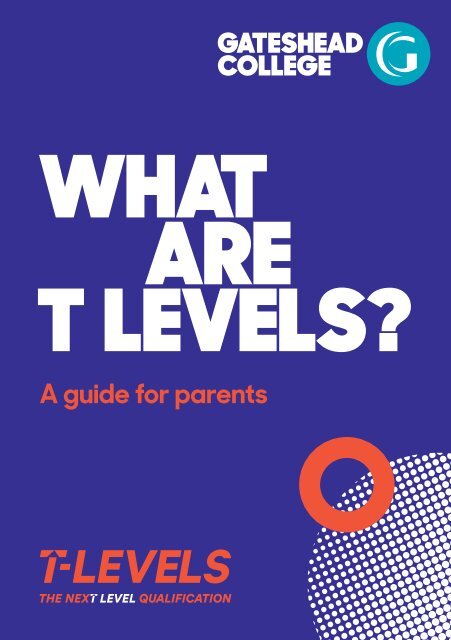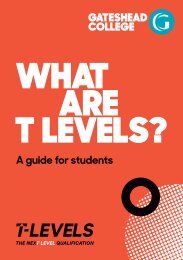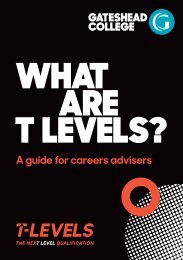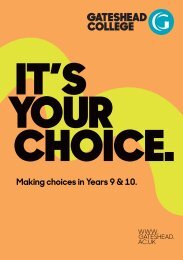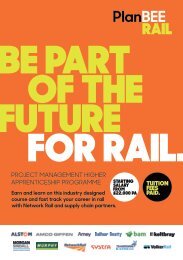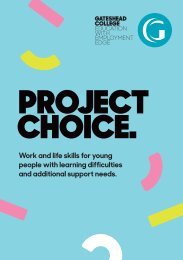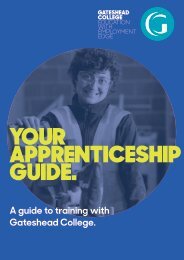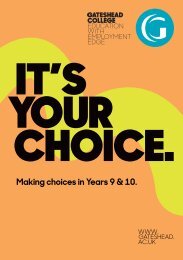T Level Guide for Parents
You also want an ePaper? Increase the reach of your titles
YUMPU automatically turns print PDFs into web optimized ePapers that Google loves.
WHAT<br />
ARE<br />
T LEVELS?<br />
A guide <strong>for</strong> parents
There are lots of options<br />
available <strong>for</strong> your child after<br />
their GCSEs including<br />
A <strong>Level</strong>s, vocational courses and<br />
apprenticeships. Helping them<br />
decide what to study can be<br />
daunting, especially when there<br />
are new qualifications like T<br />
<strong>Level</strong>s to consider. Take a look at<br />
this simple guide which explains<br />
everything you and your child<br />
need to know about T <strong>Level</strong>s.<br />
What are T <strong>Level</strong>s?<br />
T <strong>Level</strong>s are practical career focused<br />
qualifications <strong>for</strong> 16 to 19 year olds<br />
which are studied over 2 years.<br />
They’re equivalent to three A <strong>Level</strong>s<br />
and combine classroom study with<br />
a 45 day industry placement to<br />
prepare your child <strong>for</strong> the world of<br />
work, or further study like a higherlevel<br />
apprenticeship or university.<br />
They offer your child an ideal first<br />
step into their future career and as<br />
they’ve been designed by employers<br />
you can be confident that your<br />
child is being taught the skills and<br />
knowledge <strong>for</strong> their chosen industry.<br />
A T <strong>Level</strong> is made up of:<br />
● A technical qualification - Your<br />
child will spend 80% of their<br />
time at college studying<br />
<strong>for</strong> this qualification<br />
●<br />
An industry placement - 20% of a<br />
T <strong>Level</strong> is an industry placement<br />
with an employer, which will<br />
last a minimum of 315 hours<br />
(approximately 45 days)
What T <strong>Level</strong> subjects are there?<br />
T <strong>Level</strong>s cover a wide range of<br />
sectors and interests. We currently<br />
offer T <strong>Level</strong>s in the following areas:<br />
● Business<br />
●<br />
●<br />
●<br />
●<br />
●<br />
Construction<br />
Digital Technologies<br />
Early Years<br />
Engineering<br />
Health and Social Care<br />
What’s the difference between T <strong>Level</strong>s<br />
and A <strong>Level</strong>s?<br />
The main difference between T<br />
<strong>Level</strong>s and A <strong>Level</strong>s is that T <strong>Level</strong>s<br />
focus on one subject while A <strong>Level</strong>s<br />
are multiple subjects. T <strong>Level</strong>s are<br />
more practical/vocational, whereas<br />
A <strong>Level</strong>s are more theoretical.<br />
What’s the different between T <strong>Level</strong>s<br />
and a vocational course?<br />
T <strong>Level</strong>s are the technical equivalent<br />
to three A <strong>Level</strong>s. They cover:<br />
● core theory<br />
●<br />
concepts and specialist skills<br />
● knowledge <strong>for</strong> a specific<br />
career or occupation.<br />
The main difference between the<br />
T <strong>Level</strong> and a <strong>Level</strong> 3 course is the<br />
compulsory industry placement.<br />
What grade will my child get <strong>for</strong><br />
studying a T <strong>Level</strong>?<br />
Your child will receive an<br />
overall grade of pass, merit,<br />
distinction or distinction*.<br />
Will my child be able to go to University<br />
after they’ve studied a T <strong>Level</strong>?<br />
Yes, T <strong>Level</strong>s have been designed to<br />
provide students with the knowledge,<br />
skills and experience needed to<br />
progress onto a range of options<br />
including work, higher education or<br />
apprenticeships. If you child achieves<br />
Distinction* in their T <strong>Level</strong> this is<br />
the same as 3 x A* at A <strong>Level</strong>s.<br />
Here’s a guide to the T <strong>Level</strong><br />
grades compared to the A <strong>Level</strong><br />
equivalent and UCAS Tariff points:<br />
T <strong>Level</strong> Grade<br />
A <strong>Level</strong><br />
Equivalent<br />
UCAS<br />
Tariff<br />
points<br />
Distinction* A* A* A* 168<br />
Distinction A A A 144<br />
Merit B B B 120<br />
Pass<br />
(C or above<br />
on the core)<br />
Pass<br />
(D or E on<br />
the core)<br />
C C C 96<br />
D D D 72<br />
If your child isn’t wanting to continue<br />
their studies after their T <strong>Level</strong>,<br />
going straight into employment<br />
is an option <strong>for</strong> them and thanks<br />
to their industry placement, your<br />
child will have a head start on the<br />
skills they’ll need in the workplace.
What are the entry requirements <strong>for</strong><br />
a T <strong>Level</strong>?<br />
To be able to study a T <strong>Level</strong><br />
with us, your child will need to<br />
achieve 5 GCSEs at grades 5 – 9<br />
including English and maths.<br />
Will my child need to find their own<br />
industry placement?<br />
No, they won’t. We’ve got a<br />
dedicated team who work with<br />
employers from across the<br />
region to secure placements<br />
<strong>for</strong> our T <strong>Level</strong> students.<br />
Will my child get paid when they are on<br />
their industry placement?<br />
No, your child won’t be paid<br />
when they are on placement.<br />
What are the benefits of studying<br />
a T <strong>Level</strong>?<br />
Studying a T <strong>Level</strong> helps your child<br />
● find out more about the career<br />
opportunities open to them<br />
●<br />
●<br />
●<br />
build essential skills, such as<br />
teamwork and communication<br />
put their skills and knowledge into<br />
practice in the real world of work<br />
build contacts with employers.<br />
As well as helping them to<br />
make more in<strong>for</strong>med choices<br />
about their career pathway,<br />
they will get experience that<br />
employers are looking <strong>for</strong>.<br />
T <strong>Level</strong>s are a good option even if<br />
your child only has a rough idea of<br />
the career or field they’re interested<br />
in. The study and industry placement<br />
aren’t linked to a specific role or<br />
job. Instead your child will be given<br />
broad exposure to an industry and<br />
the many different roles it offers.<br />
“We think it’s great that T <strong>Level</strong>s are courses designed<br />
with employers. We actively get involved with Gateshead<br />
College to feedback what skills should be covered to make<br />
sure that they give students the skills employers like us are<br />
are looking <strong>for</strong>. The placements give students a chance to<br />
see what the working environment is like and apply their<br />
learning in a real-world setting. Placements also allow<br />
them to get a better understanding of the industry they’re<br />
interested in and even open them up to new possibilities they<br />
were not previously aware of.”<br />
James Hanson, Managing Director, Layers Studio.
Chloe Perrin completed the T <strong>Level</strong> in<br />
Education and Early Years and is now studying<br />
<strong>for</strong> a degree in Social Work at Northumbria<br />
University. Her favourite part of the course<br />
was the industry placement as it gave her<br />
a real insight into her chosen career.<br />
“The T <strong>Level</strong> has given me so much<br />
confidence and experience and<br />
enabled me to get exactly where I<br />
want to be - studying social work at<br />
university. The blend of vocational<br />
experience and classroom learning<br />
has given me the tools I need to be<br />
one step ahead in higher education.”
Hannah Carney also completed the<br />
T <strong>Level</strong> in Education and Early Years and<br />
has moved onto Northumbria University<br />
to study a degree in Childhood and Early<br />
Years Studies. Her favourite part of the<br />
course was also the placement because it<br />
helped her gain experience of working with<br />
children and experienced early years staff.<br />
“The T <strong>Level</strong> has given me the chance<br />
to move onto higher education to<br />
pursue my career. It’s helped me<br />
get here by building my confidence<br />
and giving me real life experience in<br />
nurseries.“
@gatesheadcollege<br />
@gatesheadcoll


